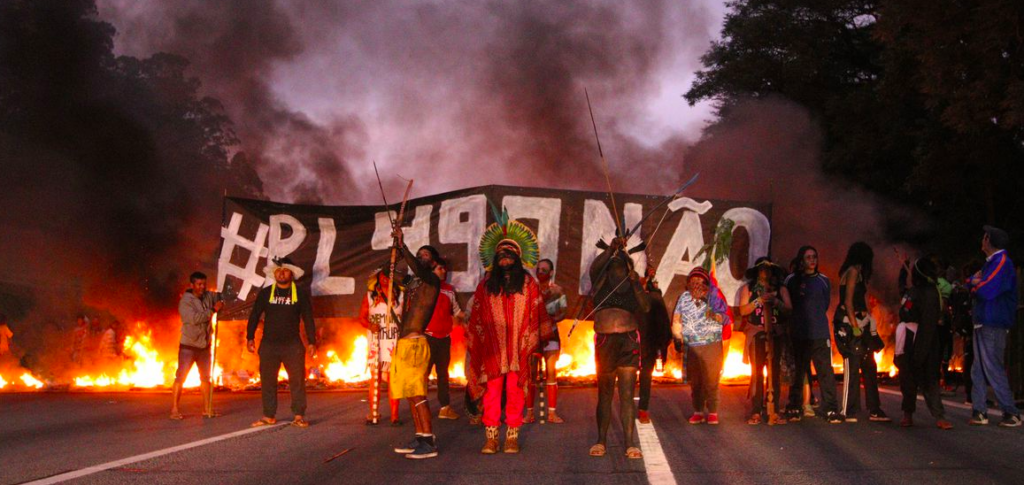The time frame for indigenous lands, approved by 283 votes to 155, establishes that lands reserved for indigenous communities must be restricted to those occupied by indigenous people since 1988, the year the current Constitution was promulgated.
ADVERTISING
Base text of the Temporal Framework is approved by 283 to 155.
- Metropolis (@Metropoles) May 30, 2023
Check the moment the result is announced.
Read: https://t.co/penaJnoRvD pic.twitter.com/ueWxHzmq1G
With approval in the Chamber, the proposal goes to a vote by senators.
According to the approved text, it is necessary to confirm that traditionally occupied lands were, at the same time, permanently inhabited, used for productive activities and necessary for the preservation of environmental resources and physical and cultural reproduction on the date of promulgation of the Constitution.
If the indigenous community was not in a certain territory before that date, regardless of the reason, the area will not be recognized as traditionally occupied.
ADVERTISING
Importance of demarcating indigenous lands
The project was promoted by deputies sympathetic to agribusiness and other opposition groups and represents a setback for promeLula's environmental issues.
According to scientists, the demarcation of indigenous lands is a fundamental barrier to the advancement of deforestation in the Amazon, the largest tropical forest in the world.
Indigenous communities reject the project, arguing that they have the right to their original territories, regardless of the occupation in 1988.
ADVERTISING
Associations and activists claim that many people did not occupy certain territories that year because they were expelled, mainly during the military dictatorship (1964-1985).
There are a total of 764 indigenous territories in Brazil, but around a third of them have not yet been demarcated, according to data from the National Foundation of Indigenous Peoples (Funai).
Lula recognized six new territories in April, the first in five years, after the process was halted during the term of former president Jair Bolsonaro.
ADVERTISING
'Extermination'
The Minister of Indigenous Peoples, Sônia Guajajara, said this Tuesday that the “majority of Congress voted against indigenous peoples and nature”.
“But let’s not stop! We have the Senate ahead of us and many dialogues to be held to guarantee the preservation of our lives and territories. We will not accept a Brazil without indigenous peoples”, tweeted the minister.
The vote in the Chamber of Deputies sparked protests and caught the attention of international NGOs and activists, such as American actors Leonardo Di Caprio and Mark Ruffalo.
ADVERTISING
“There is a war against indigenous peoples and forests. Our planet is at risk. Lula, be the hero your people elected, stop the progress of the project”, tweeted Ruffalo on the eve of the debate.
Before the vote, around a hundred indigenous people momentarily blocked a highway on the outskirts of São Paulo in the early hours of Tuesday, before the police dispersed them with tear gas, according to images released on TV.
Organizations such as Greenpeace or the Climate Observatory, which classified this Tuesday's vote as a “shameful” day in the history of Congress, reject the project.
“The Chamber of Deputies gives a clear message to the country and the world: Bolsonaro is gone, but the extermination continues. (…) The Senate now has the obligation to reverse the absurdities approved by the Chamber”, said the Observatory in a note.
“Urgent” treatment
The project approved this Tuesday was originally presented in 2007, but gained prominence during the Bolsonaro government, a defender of the exploitation of natural resources within indigenous reserves.
Last week, a majority of 324 against 131 deputies managed to put the project back on the table to be voted on “urgently” by the plenary this week.
The objective is to anticipate a possible decision by the Federal Supreme Court (STF) against the implementation of the time frame, scheduled for June 7th.
“I hope that the STF has the sensitivity to see that the process is advancing in the Chamber and it does not make sense (the court) to fulfill a role (of Congress)”, said deputy Arthur Maia (União-BA), rapporteur of the project, to press this Tuesday.
At the same time, Congress could still inflict a new defeat on Lula if this week it approves changes to the government structure, also promoted by the ruralist caucus, which dilute the power of the ministries of the Environment -headed by Marina Silva- and Indigenous Peoples.
The environmental department, for example, would lose its powers over the registration of rural lands, essential in monitoring and combating illegal deforestation, and over the management of water resources.
(With AFP)
Curto Curatorship:
- Time frame: see how each deputy voted (g1)
- Chamber approves Marco Temporal PL and imposes defeat on Lula government (Stay)
- Understand what the time frame is (Brazil Agency)
Read also
* The text of this article was partially generated by artificial intelligence tools, state-of-the-art language models that assist in the preparation, review, translation and summarization of texts. Text entries were created by the Curto News and responses from AI tools were used to improve the final content.
It is important to highlight that AI tools are just tools, and the final responsibility for the published content lies with the Curto News. By using these tools responsibly and ethically, our objective is to expand communication possibilities and democratize access to quality information. 🤖






